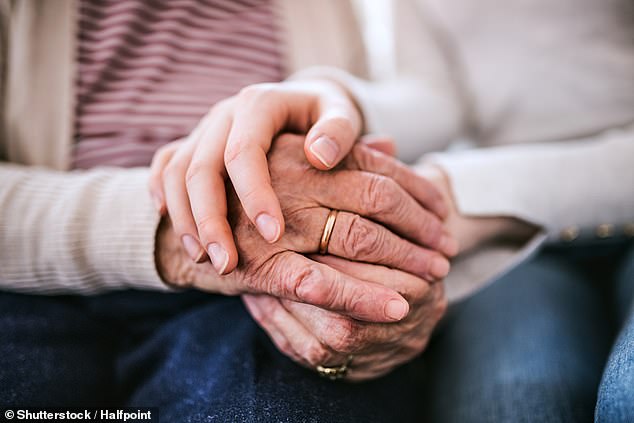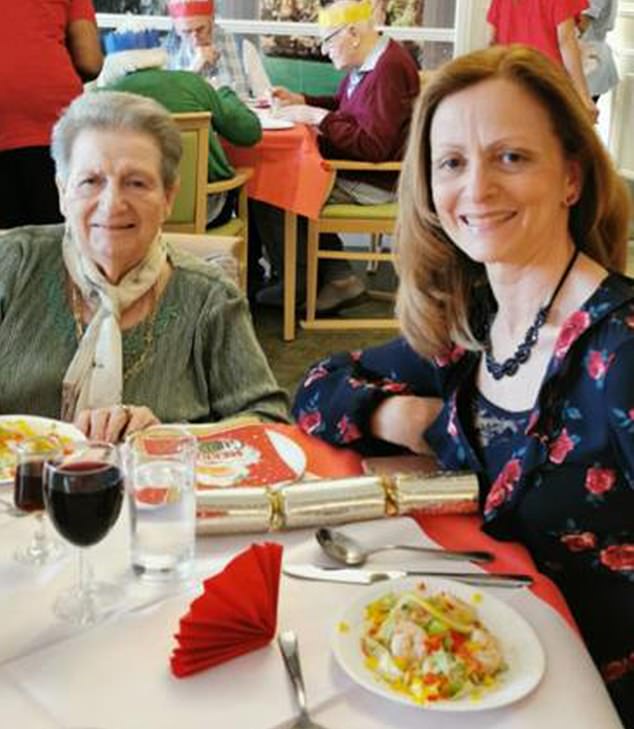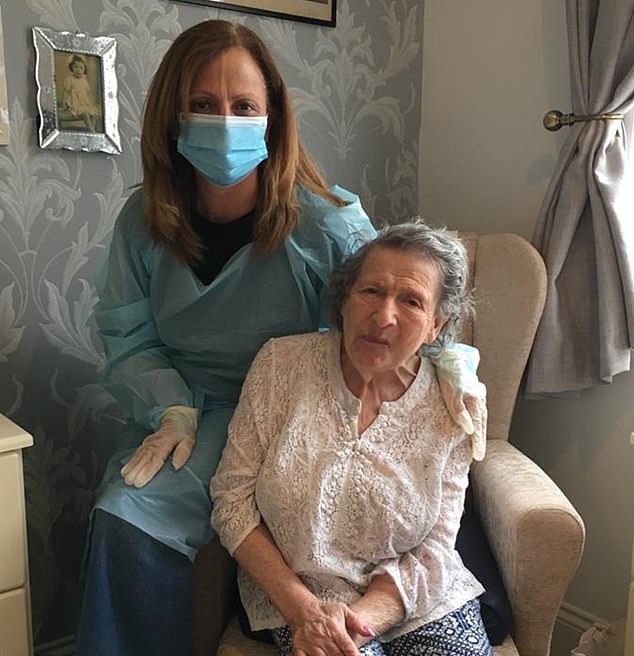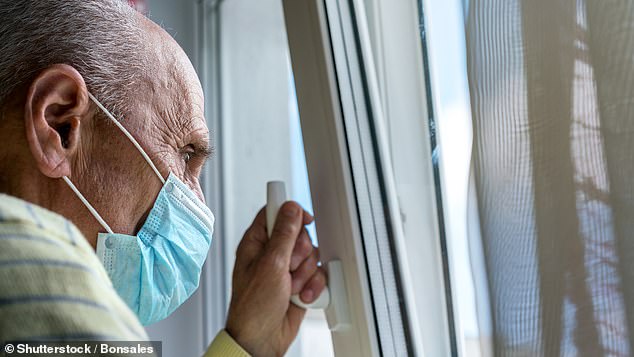Residents in some care homes are still being subjected to ‘abominable’ Covid isolation rules almost two months after the Government scrapped them.
Since August, vaccinated care home residents have come under the same protocols as the rest of the population, and should not have to self-isolate if they come into contact with someone with Covid-19 unless they test positive themselves.
But The Mail on Sunday has heard from many worried families, concerned that their relatives are being forced to abide by the old restrictions after close contact with an infected person – often a member of staff – and stay alone in their bedrooms for ten days.
During this time, carers will enter residents’ rooms only to deliver meals or provide essential medical care.
Families also revealed they are still being barred from visiting relatives in care homes after a positive test among staff – as was the situation before the strict rules were revoked – but that the ban can stretch to weeks on end if more Covid infections emerge and management triggers back-to-back periods of isolation.
In some cases, vulnerable residents have ended up spending their final days alone.

Campaigners have accused care home managers of ‘making up their own rules’ and taking an ‘overcautious’ approach at the expense of residents’ mental health. [File image]
Campaigners have now accused care home managers of ‘making up their own rules’ and taking an ‘overcautious’ approach at the expense of residents’ mental health, given that their staff are free, like everyone else, to go about their business as normal.
And last night an MP accused care homes of making the nation’s most vulnerable people ‘prisoners in their own homes’ and called on the new Care Minister, Gillian Keegan, to take action.
Dr Dan Poulter, the MP for Central Suffolk and North Ipswich and an NHS psychiatrist, said: ‘It is unacceptable that some care homes are still forcing residents into isolation for no good reason.
‘It shouldn’t be the case that older people are still being made prisoners in their own homes.’
Dr Poulter, who is also vice-chairman of the All-Party Parliamentary Group on Coronavirus, added: ‘We need to see a more proactive approach from the Care Minister.
‘Care homes need to be reminded of their duty to residents. Social isolation is damaging for older, vulnerable people.’
Harriet Harman MP, chair of the Joint Committee on Human Rights, said: ‘The lack of action is simply unacceptable. In May, we published a report calling for an end to blanket bans on care home visits.
‘It was clear then that regulations on individualised assessments for visits needed to be made a legal requirement if the vital link between care home residents and their loved ones is to be maintained.’
Campaigners have spoken out at the unfairness of the situation, given that care staff do not have any restrictions on their movement if they come into contact with someone with Covid.

Dr Dan Poulter, the MP for Central Suffolk and North Ipswich, accused care homes of making the nation’s most vulnerable people ‘prisoners in their own homes’
Julia Jones, co-founder of dementia charity John’s Campaign, said: ‘Care workers are able to come and go from homes as they please, and are able to socialise with whoever they like outside of work.
‘Inevitably this means they are far more likely to catch the virus than residents. But unlike residents, they do not have to go into isolation when a colleague tests positive.’
In the majority of cases made known to The Mail on Sunday, isolation rules had been triggered when a staff member had tested positive.
Sometimes, according to accounts from families, the staff member had not even been in direct contact with the resident.
When approached with this report, The Care Quality Commission, which inspects health and social care services in England, said: ‘Blanket approaches to visiting and managing risks related to Covid-19 are unacceptable’, adding that this type of practice could ‘trigger an inspection’.
Last month, members of John’s Campaign and the Rights For Residents advocacy group led a protest to Downing Street to deliver a petition with 267,000 signatures urging Ministers to take action against continued restrictions in care homes.
Blumah Samuels, 90, was placed in isolation for a full month in August after two staff at her North London care home tested positive for the virus.
At first, management decided to isolate residents for two weeks, despite the majority of them, including Blumah, being fully jabbed.

Blumah Samuels, 90, (left) and daughter Lesley Lightfoot, 61, celebrate Christmas together at a North London care home in 2019
Blumah’s daughter Lesley Lightfoot, 61, a costume design teacher, said her mother had been ‘almost entirely alone’ in her room for the majority of the pandemic, and that the decision to isolate the residents again in August came just hours before her 90th birthday party.
‘Everything was perfectly planned,’ says Lesley.
‘Mum and I picked out her favourite outfit the day before, I had got all her favourite foods from the deli and decorated the room with presents. I’d even asked two of her best friends to surprise her in the garden – she hadn’t seen them for two years.
‘When I said goodbye to her the day before, she whispered how excited she was. And then this happened – it was devastating.’
To make matters worse, a week into Blumah’s isolation, another resident tested positive.
Lesley adds: ‘This meant they had to start the isolation all over again. In the end she was in quarantine for four weeks. Mum was in her bedroom all day. She had all her meals in the room with no one to talk to.’B

Blumah, who has dementia, was placed in isolation for a full month in August after two staff at her North London care home tested positive for the virus. Above: Lesley and her mother pictured together, March 2021
Lesley says that her mother has deteriorated rapidly since spring. ‘My mum has dementia, which makes her terrified and confused when she doesn’t see people she recognises, or have access to some sort of stimulation.
‘The situation is abominable. This is a brutal and unnatural way to treat humans. Just because my mother is elderly doesn’t mean they can shove her in a room and forget about her.’
The Mail on Sunday was the first newspaper to sound the alarm on the injustices suffered by care homes as a result of the pandemic, back in September 2020.
Thousands were being kept in lockdown, unable to even speak to loved ones through open windows, for more than six months.
After months of campaigning, the Government finally eased restrictions.
Under guidance that came into force in April, residents were allowed an unlimited number of ‘named visitors’ who would be able to enter the care home after negative tests.
They could also nominate one ‘essential care giver’ to undergo regular testing and visit the home to deal with essential needs.
In May, rules were scrapped that had forced residents who left the home – for a day trip or hospital visit – to isolate for two weeks on their return.
Then in August the Government announced that fully jabbed care home residents, along with the rest of the double-vaccinated population, were no longer required to isolate after coming into contact with a Covid-positive person, provided they test negative for the virus.
In the case of care home outbreaks – two or more positive cases – the Government advise that ‘outbreak measures’ should only last between four and seven days, if residents test negative.
But campaigners say many care homes have failed to change their policies to match the latest guidance.

In August the Government announced that fully jabbed care home residents, along with the rest of the double-vaccinated population, were no longer required to isolate after coming into contact with a Covid-positive person, provided they test negative for the virus. [File image]
Ms Jones says: ‘The return to normal life that Boris Johnson promised the country hasn’t happened in care homes.
‘Far too many are still not even recognising essential carers.
‘Meanwhile, residents are being confined to their rooms every time a positive case pops up.’
So why, if the Government is finally giving everyone their long-awaited freedom, are care homes enforcing the opposite?
Ms Jones, whose group campaigns for the rights of families of dementia patients, says part of the problem is a lack of official regulation.
‘Care homes are private institutions so can set their own rules,’ she says. ‘The Government has published guidance, but managers aren’t obliged to follow it.’
In August, John’s Campaign launched a legal bid to force the Department of Health and Social Care to compel care homes to comply with the guidance.
But in a letter to the group’s legal team, the Government dismissed the issue, maintaining that ‘fully vaccinated care home residents no longer need to isolate if they have been notified they are a close contact of someone who is Covid-positive’.
This was not the case for 48-year-old David Caplan, who was forced to isolate in his care home bedroom for two weeks at the start of September after a staff member on another wing tested positive for Covid.
David, who has cerebral palsy and needs 24-hour care, has been living in a North London care home for 25 years.
He is non-verbal, so communicates through an iPad, and needs a wheelchair to get around, but this has never stopped him leading an active lifestyle.
‘He used to have a voluntary job at the offices next to the care home, and would go in every day,’ says his sister Niki Caplan, 44, a GP.
‘Every weekend he would come home to my parents’ house and we’d have family dinners. He was happy.’
But things changed for David when his care home locked down in early March, and while the strategy was effective at stopping the spread of the virus, David suffered as a result.
David’s family say they were unable to see him in the home until June 2020. Niki said: ‘It made sense, but he was so lonely in there.’
David received his second Covid jab in January, and his family hoped that the rule changes in August would provide him with more freedom.
‘We thought he could maybe start going back to the office and socialising again. But it hasn’t made any difference because they’re still quarantining all the residents every time they have a single Covid case.’
At the beginning of September, a staff member in David’s care home tested positive for the virus.
Despite not coming into contact with the person and also testing negative, David was forced to isolate in his room for two weeks.
Niki says: ‘The staff would come in to wash and feed him, but once that was done they would leave him alone all day. He had social media and his TV, but two weeks is a long time on your own and his mental health really suffered. Eventually the home had to refer him to mental health services because he was so distressed. ’
There is one self-isolation rule that the Government still supports. While care home residents don’t have to quarantine when returning from a planned hospital appointment – including surgery – they do if they are admitted as an emergency.
The Mail on Sunday asked the Department of Health and Social Care for an explanation as to why this rule is in place, and it was unable to provide a justification.
But it’s this policy, families claim, that denies them time with loved ones at the end of their lives.
Paula Chandler, 56, a former social worker from Bristol, says her family have been ‘robbed’ of spending time with her father, Bernard Wools, as he faces his final days.
The 84-year-old suffers with dementia and lives in a care home in Yate, Bristol.
When the self-isolation rules were lifted in August, Paula was ecstatic – given that in the past year she’d seen him for a total of 14 hours. She says: ‘Knowing he was so often frightened and alone during that period destroyed me.’
But on August 20, Bernard was admitted to hospital with a urine infection and, three days later, he fell out of his hospital bed and broke his hip.
When Bernard was finally discharged nearly a month later, his care home placed him in isolation for two weeks. The family has not seen him since.
Last Saturday, Paula received a call from the care home and was told that Bernard was days from dying.
While the family will now be allowed to visit him when the time comes, as part of exceptions for end-of-life residents, Paula says that because of the ‘cruel’ Government guidance, her father has been forced to spend the final weeks of his life alone.
She says: ‘Just at the time he needed us most, we were forced to be apart.’
Paula joined the protest outside Downing Street on September 16, where she held up a sign that read: ‘I’d rather my dad died of Covid than loneliness.’
Helen Wildbore, head of the Relatives And Residents Association campaign group, says: ‘The two-week blanket approach for patients returning from hospital is nonsensical and bordering on criminal. Testing is available.
‘There is no reason to lock them up on their own. We hear of people who stop eating, stop drinking and essentially give up the will to live.’
Campaigners say the ‘biggest scandal’ is the difference in quality of life between those living in residential care and the rest of the country.
Ms Wildbore adds: ‘If I wanted to, I could jet off on holiday or go to a festival with thousands of people. But if I lived in a care home, I would be living under rules which barred me from holding my husband’s hand.’
In a statement, the Department of Health and Social Care said: ‘If people have concerns with the visiting arrangements available, we urge them to raise the matter with the care home, and then contact the CQC if they are not satisfied that the issue is resolved.’
Covid Q&A: Can I have Covid and flu jabs together, and could a pill save us?
Q: Can I have a Covid booster at the same time as my flu jab?
A: Yes. A study published on Friday showed it is safe.
Researchers at the University of Bristol looked at 679 volunteers due to have their second dose of the AstraZeneca or Pfizer vaccine.
Half had the flu jab alongside their second Covid vaccine, the other half were given a placebo.
Three weeks later they returned, and those who’d had the placebo got the real thing and vice versa.
The study showed there was no discernable difference in side effects between the two groups or levels of antibodies – an important indicator of a vaccine’s success.
It is not unusual for multiple vaccines to be given at once, but the study will reassure the 30 million Britons eligible for a booster jab, as they are the same group expected to have a flu shot.
Dr Rajeka Lazarus of University Hospitals Bristol, who led the study, said: ‘We have been able to establish that it is possible to protect people from Covid-19 and flu at the same appointment. This is a really positive step.’
Q: I’ve heard there’s now a pill that cures Covid – is it true?
A No. The closest we have to a cure for serious Covid illness is the vaccine, which stops patients being hospitalised in about 90-95 per cent of cases.
An effective pill could be game-changing, given that hundreds of thousands of people will not mount a good immune-system response to the vaccine, and more are unvaccinated.
But results of an international trial testing the drug, molnupiravir, appear very promising.
When the antiviral pill was given within six days of the onset of symptoms to 400 patients with at least one risk factor for severe Covid-19, it slashed the risk of hospitalisation by half. It works by interfering with the mechanism that viral cells use to replicate many times over,.
The outcome is far better than dexamethasone, which cuts the risk of death by a third in severely ill, hospitalised patients.
Experts are optimistic but cautious. Dr Simon Clarke, Associate Professor in Cellular Microbiology at the University of Reading, said: ‘This news is positive, but we must not be carried away. There is still no cure for Covid.’
Source link : https://www.dailymail.co.uk/health/article-10052227/Worried-families-ask-vulnerable-prisoners-care-home.html











